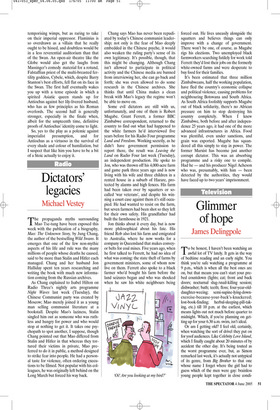Dictators’ legacies
Michael Vestey
The propaganda myths surrounding Mao Tse-tung have been exposed this week with the publication of a biography, Mao: The Unknown Story, by Jung Chang, the author of the bestselling Wild Swans. It emerges that one of the few non-mythic aspects of his life and rule was the many millions of people whose deaths he caused, said to be more than Stalin and Hitler each managed. Chang and her husband Jon Halliday spent ten years researching and writing the book with much new information coming from the Russian archives.
As Chang explained to Isabel Hilton on Radio Three’s nightly arts programme Night Waves last week (Tuesday), the Chinese Communist party was created by Moscow; Mao merely joined it as a young man selling communist literature at a bookstall. Despite Mao’s laziness, Stalin singled him out as someone who was ruthless and hungry for power and who would stop at nothing to get it. It takes one psychopath to spot another, I suppose, though Chang pointed out that Mao differed from Stalin and Hitler in that whereas they tortured their victims in private, Mao preferred to do it in public, a method designed to strike fear into people. He had a personal taste for violence, often ordering executions to be filmed. Not popular with his colleagues, he was originally left behind on the Long March but forced his way back. Chang says Mao has never been repudiated by today’s Chinese communist leadership; not only is the fear of Mao deeply embedded in the Chinese psyche, it would also weaken the ruling party’s sense of its own legitimacy. It’s possible, though, that this might be changing. Although Chang isn’t allowed to participate in political activity and the Chinese media are banned from interviewing her, she can go back and forth; she was even allowed to do some research in the Chinese archives. She thinks that until China makes a clean break with Mao’s legacy the regime won’t be able to move on.
Some evil dictators are still with us, unfortunately, and one of them is Robert Mugabe. Grant Ferrett, a former BBC Zimbabwe correspondent, returned to the country to find out what had happened to the white farmers he’d interviewed five years before for his Radio Four programme Land and Freedom. Working secretly, as he didn’t have government permission to report there, the result was Leaving the Land on Radio Four last week (Tuesday), an independent production. He spoke to Jon, who was thrown off his 4,000-acre farm and game park three years ago and is now living with his wife and three children in a rented house in a suburb of Harare, protected by alarms and high fences. His farm had been taken over by squatters or socalled ‘war veterans’, and despite his winning a court case against them it’s still occupied. He had wanted to resist on the farm, but seven farmers had been shot so they left for their own safety. His grandfather had built the farmhouse in 1921.
Jon thinks about it every day, but is now more philosophical about his fate. His friend Rob also lost his farm and emigrated to Australia, where he now works for a company in Queensland that makes conveyor belts for coal mines. Five years ago, when he first talked to Ferrett, he had no idea of what was coming: the state theft of farms by government ministers, some of whom now live on them. Ferrett also spoke to a black farmer who’d bought his farm before the land seizures began and who was shocked when he saw his white neighbours being forced out. He lives uneasily alongside the squatters and believes things can only improve with a change of government. There won’t be one, of course, as Mugabe rigs his elections. Two unemployed black farmworkers searching futilely for work told Ferrett they’d lost their jobs on the formerly white-owned farms and were desperate to buy food for their families.
It’s been estimated that three million Zimbabweans, half the working population, have fled the country’s economic collapse and political violence, causing problems for neighbouring Botswana and South Africa. As South Africa foolishly supports Mugabe out of black solidarity, there’s no African pressure on him to stop destroying his country completely. When I knew Zimbabwe, both before and after independence 25 years ago, it had one of the more advanced infrastructures in Africa. Food was plentiful, even under sanctions, and grain was exported. Mugabe has squandered all this simply to stay in power. The former Marxist has become just another corrupt dictator. This was an absorbing programme and a risky one to compile. Had he — and his producer Nigel Acheson who was, presumably, with him — been detected by the authorities, they would have faced up to two years’ imprisonment.


















































 Previous page
Previous page